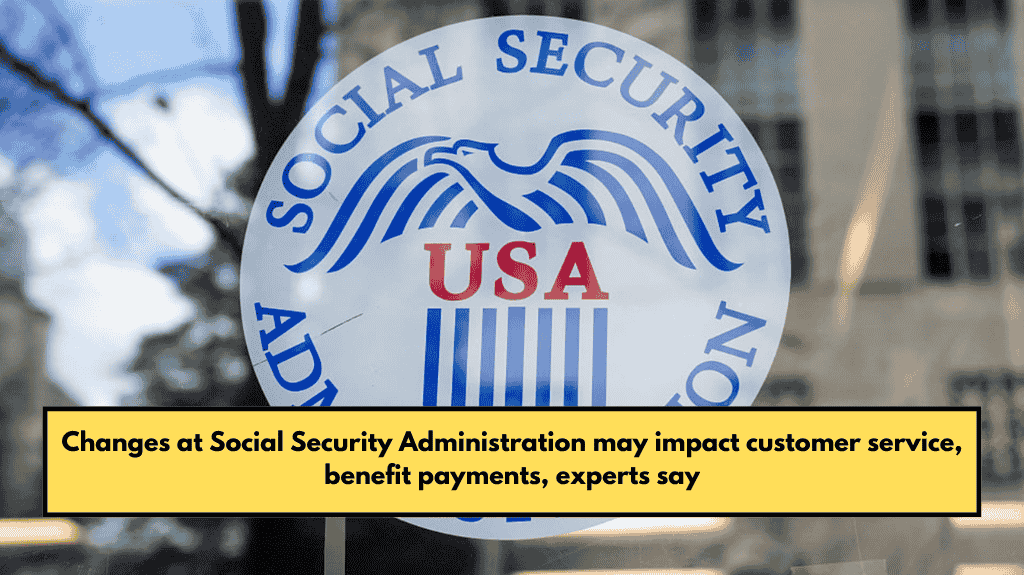The Trump administration’s so-called Department of Government Efficiency is making rapid changes at the Social Security Administration, raising concerns that beneficiaries will find it more difficult to access the agency’s services.
Some experts are concerned that efforts to update the agency’s systems will have an impact on the continuity of benefits.
“Now I’m concerned that benefits could be disrupted,” said Jason Fichtner, a former deputy commissioner of the Social Security Administration appointed by President George W. Bush.
The agency’s recent changes have raised concerns among experts, including Fichtner.
President Donald Trump has repeatedly promised not to touch Social Security benefits. However, recent changes may make it more difficult for eligible Americans to receive benefits.
The SSA, under the Trump administration, has moved to eliminate 7,000 Social Security employees and close six regional offices.
Fichtner and Kathleen Romig, a former senior Social Security Administration official, wrote a recent op-ed. The Center on Budget and Policy Priorities employs Romig as its director of Social Security and disability policy.
The cuts will have an impact on the service Americans receive when they visit Social Security’s website, which has glitches; call its 800 number, which has long wait times; or visit a field office, which can be crowded, they wrote.
This may make it more difficult for eligible Americans to claim benefits, particularly those with disabilities who face the risk of dying before receiving the funds for which they qualify.
Fichtner and Romig wrote that the Social Security Administration is in crisis, putting people’s benefits at risk.
‘You have to understand the complexity of the programs’
Fichtner expressed concern after learning that the Social Security Administration, under DOGE, intends to move “tens of millions of lines of code” written in the programming language COBOL within a few months.
“If you start messing with the system’s code, that could impact those who are already receiving benefits, and that’s a new front-and-center concern,” said Fichtner, a senior fellow at the National Academy of Social Insurance and executive director of the Retirement Income Institute at the Alliance for Lifetime Income.
While the Social Security systems could be upgraded, projects of this size are typically handled over years rather than months, according to Fichtner. Furthermore, they usually begin with smaller tests, such as with a single state, to identify bugs or other issues before expanding regionally and then nationally, he explained.
“You can’t just flip a switch one night and expect to be able to upgrade,” Fichtner told me. “It takes due diligence, and you have to understand the complexity of the programs.”
Prior to the COBOL transition reports, Fichtner stated that he was not concerned about benefit interruptions, but that changes at the agency may have an impact on customer service and cause delays for benefit applicants.
“There is no validity to these reports,” a Social Security Administration spokesperson told CNBC via email.
In an email statement, the White House added, “There is no validity to these reports.”

Bigger reforms should be focus, experts say
Some experts argue that DOGE’s focus on eliminating fraud at the Social Security Administration is misplaced.
To that point, experts say that focusing on the agency’s administrative side diverts attention away from the program’s larger issue, which is the looming depletion of the trust funds used to pay benefits.
DOGE may have good intentions in making the Social Security Administration more efficient, but its actions may not “meaningfully change the financial trajectory of the program,” according to Romina Boccia, director of budget and entitlement policy at the Cato Institute, a libertarian think tank.
If DOGE makes changes that must be reversed, they may impede benefit reforms that Congress must consider before the trust fund runs out in 2033, she said.
“Current erratic actions have the potential to undermine those much more important, bigger reforms in a misguided attempt to root out very small levels of fraud,” Boccia told reporters.
The Social Security trustees projected in 2024 that the program’s combined retirement and disability trust funds would last until 2035, at which point only 83% of benefits would be payable unless Congress found a way to resolve the situation sooner.
According to the 2024 projections, the retirement trust fund will deplete sooner than expected in 2033, when 79% of benefits may be payable. A new law that provides more generous benefits to certain public pensioners is expected to push the projected depletion dates forward.
Because the Social Security Administration’s administrative budget is less than 1% of total outlays, Charles Blahous, a former public trustee for Social Security and Medicare and deputy director of President George W. Bush’s National Economic Council, believes it is not the best area to focus on to make the program more cost-effective and efficient.
“There’s just not enough money there to make serious headway,” said Blahous, a senior research strategist at George Mason University’s Mercatus Center.
Also See:- SSI Payments Delayed in 2025? Here’s Why You Could Miss a Month!

















